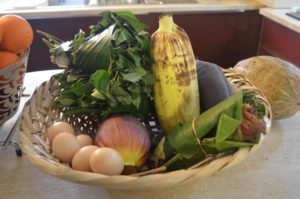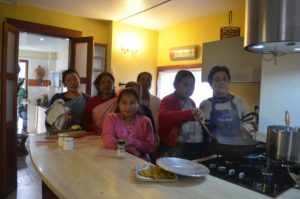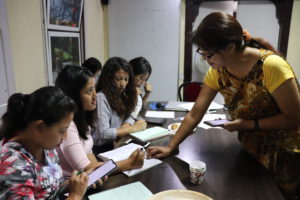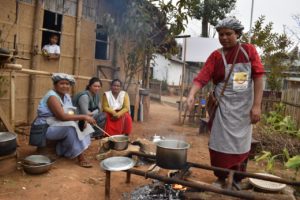On the 18th March 2017, a Cooks’ alliance workshop was held in NESFAS office whereby Mrs.Anita Roy, Board Member NESFAS shared with the local cooks of Khweng and Nongtraw community cooking techniques which strongly complement the relationship between traditional food systems and nutrition. The workshop aimed at motivating the community to focus on vegetables as an important food source, in this case to also encourage the use of abundant wild edible plants found in their village. The workshop also shared the importance of different food consumption for a healthy diet, which can also be achieved through recipe fusion and flavour innovations.

Among the participants were Kong Plantina Mujai, the owner of Mei Ramew café at Khweng, Kong Dial Muksor, the owner of a local food stall in Khweng that hopes to become a Mei Ramew café one day, Kong Pliemon Barim, cook at ICDS Khweng, Kong Tharaina Riahtam, cook at the Midday meal program Nongtraw and Kong Barilin Ranee, a passionate a youth working for the promotion of local foods of Nongtraw.


Mrs.Roy and the cooks exchanged notes on key cooking technique and some of their traditional food recipes that have been their gift from their mothers and their landscape. The local cooks who are owners of Mei Ramew Cafés and cooks of ICDS Centres play an important role in sharing awareness about traditional values and at the same time meeting contemporary concerns of nutrition and global tourists visiting their villages.
Some of the recipes included; omelette mixed with five green leafy wild edibles foraged from the forests such as jatalo, jamahek, jali, jajew, jatira, and a stew made with rice, wild edibles, with a spoonful of fish sauce.


Cooks at ICDS centres have a major role because through the mid-day meal programme, they are the ones who select food items given to the children given in a school, appropriate food items should be well distributed to the children to ensure good results in nutrition and also by encouraging children to consume important food source such as vegetables can determine their food choice.

“Our region is blessed with rich biodiversity, it is necessary that the community acknowledges ways to make use of the available food resources around them, like wild edibles or produce from their kitchen garden, rather than depending on the nearby markets” shared Pius Ranee, Associate, NESFAS.



